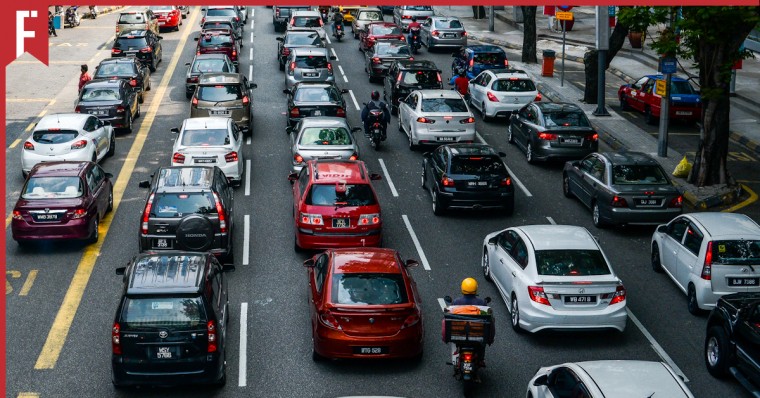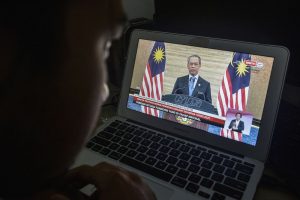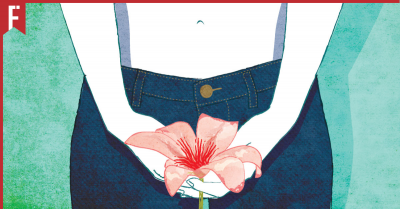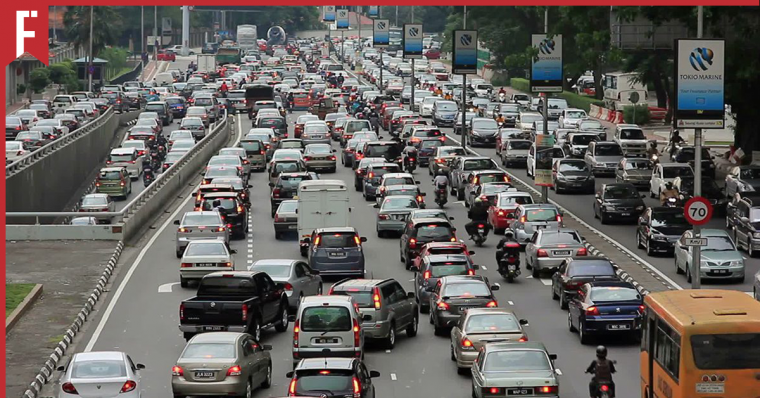
Confession time: I’ve never actually watched any of the Fast and Furious movies.
There are many reasons — not wanting to visit the cinema alone, lack of free time and/or money, the fact that Dwayne “The Rock” Johnson honestly isn’t that good at acting (and don’t even bother trying to argue, you all know I’m right).
Anyway, the point is that the only things I know about these movies come from memes. My personal favourite is that one where they split up and drive into two separate roads. You know, that one scene with the “See You Again Song” that was playing everywhere a while back?
Why? Because every time I get stuck in traffic, I wish I could just drive away from everyone so easily.
“Nothing is stronger than family… except traffic jams.”
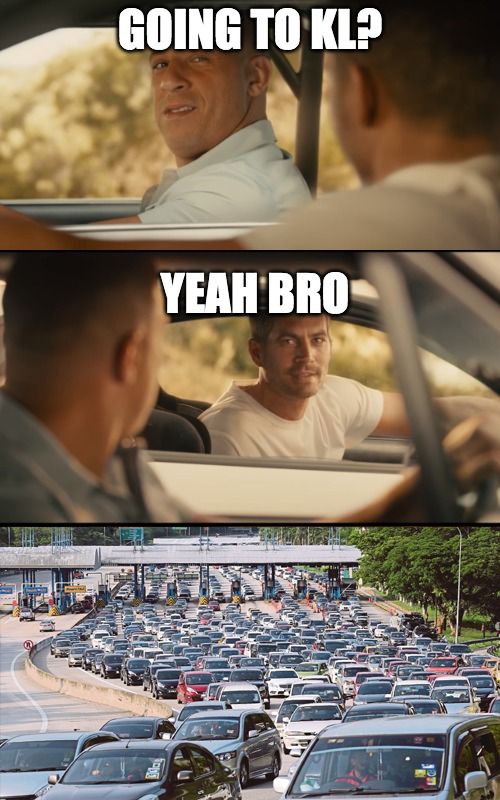
Alright, now that I’ve got that casual movie fan blasphemy out of the way, we can get to the real point of this article: traffic jams.
For many of us, traffic jams are just another regular and unfortunate part of life. You know, like period pains, only gender neutral and happening every single day rather than once a month.
If you’ve ever driven in Malaysia, you will know the pain of going out for what should have been a quick five minute drive, only to end up being stuck in traffic for over an hour. Of being surrounded by a million other sad, pathetic people who currently hate you just as much as you hate them. Of having to keep slowing down because some absolute twit in an oversized SUV suddenly cuts you off because he decided that he absolutely has to change lanes right now —
Ahem.
In any case, Malaysian traffic — and Klang Valley traffic in particular — has been receiving a lot of attention lately. Even after the Raya rush has ended, Malaysian drivers are complaining about how the traffic jams feel worse than ever before.
And You Know What? They’re Right
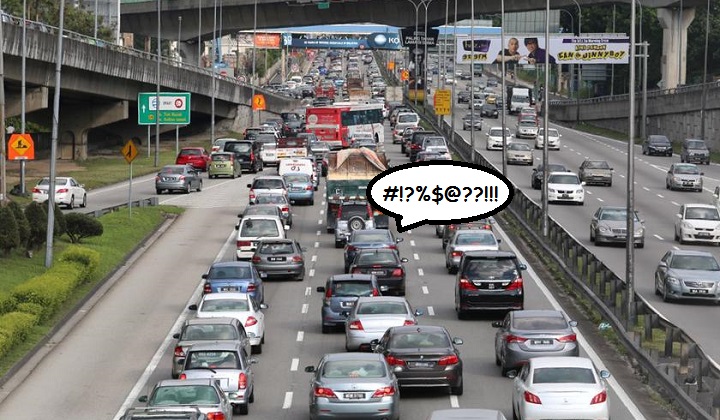
It’s not just your imagination. KL traffic has quite literally gotten worse compared to pre-pandemic times.
On 20 May 2022, a Malaysiakini report found that one of the reasons why KL traffic has gotten worse (as much as 74% worse!) in 2022 was because more workers have returned to the office.
According to the TomTom Traffic Index, KLites have lost the equivalent of 48 hours a year due to traffic congestion. Things have gotten so bad that international driver education company Zutobi has rated Malaysia as the eighth most dangerous country in the world to drive in.
Ironically enough, we’re also the country with the lowest amount of alcohol-related road traffic deaths (0.1%), which means that our drivers are just naturally terrible even without any alcohol involved.
And it’s not just KL either. On 27 May 2022, Former Transport Minister Anthony Loke called on the government to find a solution for Malaysia’s traffic woes by describing his own experiences during a recent trip to Seremban.
“It took me two hours to drive back to Seremban when it was only a 60km journey,” he said. “What is happening? The government needs to get to the bottom of this. Malaysians cannot wait anymore.”
Why Has Our Traffic Gotten So Bad Recently?
Although we still had jams a few years back, it was still possible to avoid as long as you refrained from driving during peak hours.
Now, however, it feels like the jam is going to be there no matter what.
Time? Weather? Road conditions? None of that matters. The traffic jam is inevitable. I once stayed in the office until 8pm and still got stuck in a jam when I finally tried to go home.
Factor #1: More People On The Road
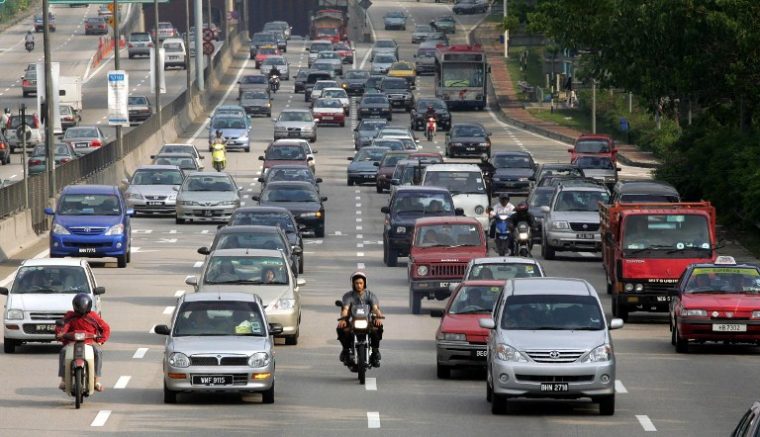
According to Road Safety Expert Rozmi Ismail, one of the big factors behind these jams is the greater freedom of movement that we’re all enjoying as the COVID-19 pandemic slowly fades away.
Simply put, as more people become comfortable with going out, more cars will be driving on our roads. After the relative peace and quiet of the past few years, this sudden surge has caught many Malaysian drivers by surprise.
“It’s a continuation of the congestion that occurred during the recent Hari Raya period,” said Rozmi. “As a result, traffic jams are occurring almost every day, including weekdays, irrespective of whether it’s rush hour or not.”
Factor #2: Rain Rain Go Away
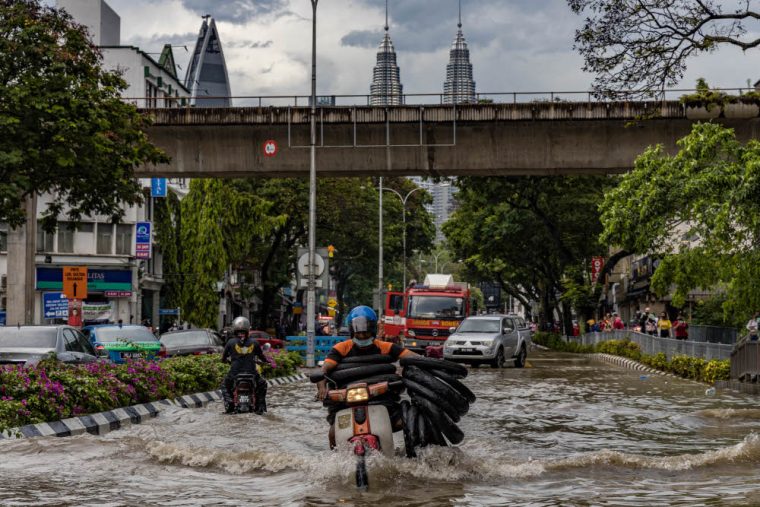
Over the past few months, KL has been flooded so many times that it’s actually starting to get ridiculous.
Despite billions of ringgit being spent on anti-flood measures like the SMART tunnels, KLites have grown to fear the sound of thunder because they know that it’s going to lead to big traffic jams later.
“Enough is enough,” said DAP MP Lim Lip Eng in a public statement demanding heads to roll for the city’s frequent flooding.
“Every time there is a downpour for not even half an hour, Kuala Lumpur residents are not spared massive floods. Their cars will have to go through major repairs… In each flood incident, losses to properties cost millions of ringgit.”
Factor #3: Public Transport? How About Public Will-Not?
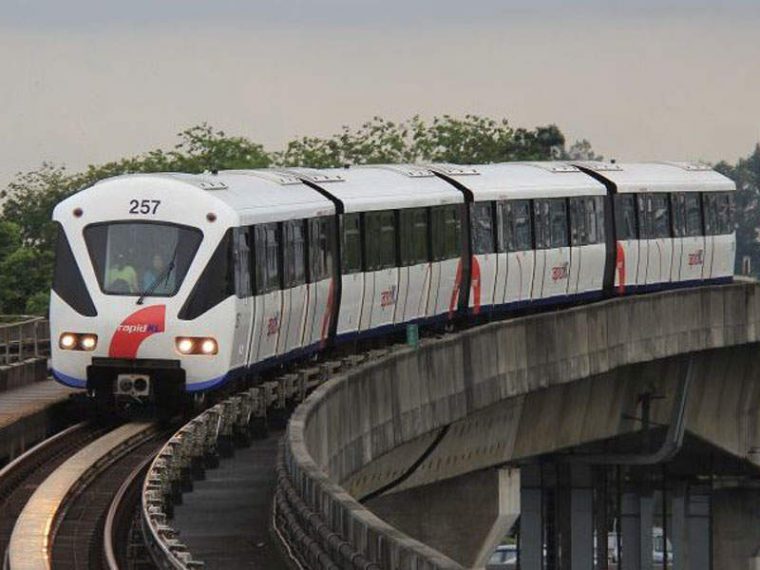
Over the years, our government has invested billions of ringgit into our public transport systems. Yet, a 2020 study found that only 20% of Klang Valley residents use public transport — far below the government’s target of 40%.
“The problem with public transportation [in Klang Valley] is that it’s not convenient,” said TRANSIT Malaysia Member Fazley Fadzil during an interview with VICE World News.
“You go out of your house, you look out, and you see the MRT station is across a six-lane highway. Before you even get to the highway, you have to go through unpaved sidewalks, cross multiple routes, and climb the stairs to get to the station itself.”
As a result of this inconvenience, many Malaysians are forced to rely on cars — either their own private vehicles or Grab e-hailing — just to get to the station. This is not only annoying, but also kind of defeats the point of having public transport in the first place!
What Can We Do To Avoid Traffic Jams?
If you’re sick and tired of being stuck in traffic jams, here are a few simple things that you can do to avoid the experience.
1. Work From Home
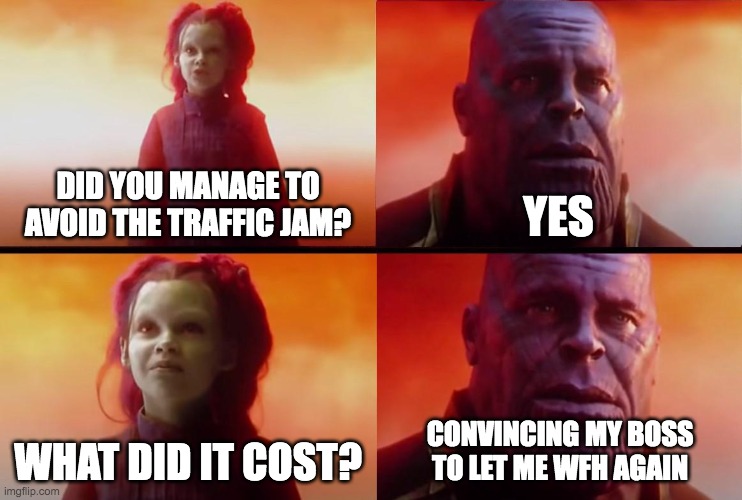
To put it simply, you can’t get stuck in a traffic jam if you never leave your house in the first place. One of the reasons why there’s so many traffic jams nowadays is the fact that so many employers are demanding that their workers return to office. If you can, try to convince your boss to let you stick to working from home instead.
2. Find Alternate Routes
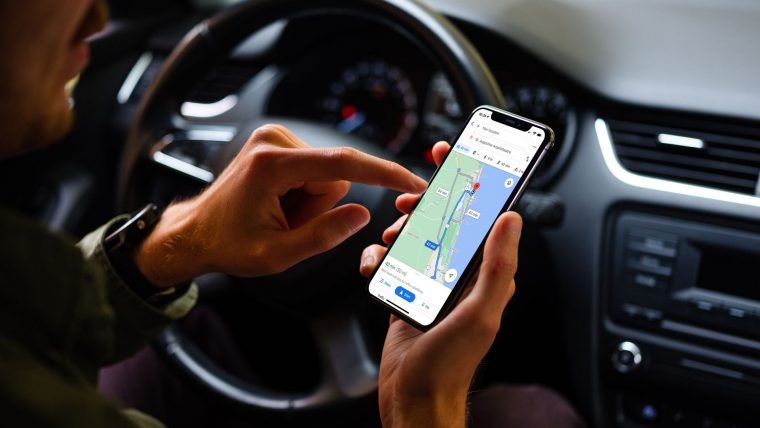
Another big cause of traffic jams is that too many cars are trying to travel down the same road at once. You can bypass this problem by planning out alternative routes towards your destination. Even if it’d take a little longer, surely it’s got to be better than being stuck in a jam, right?
3. Public Transport
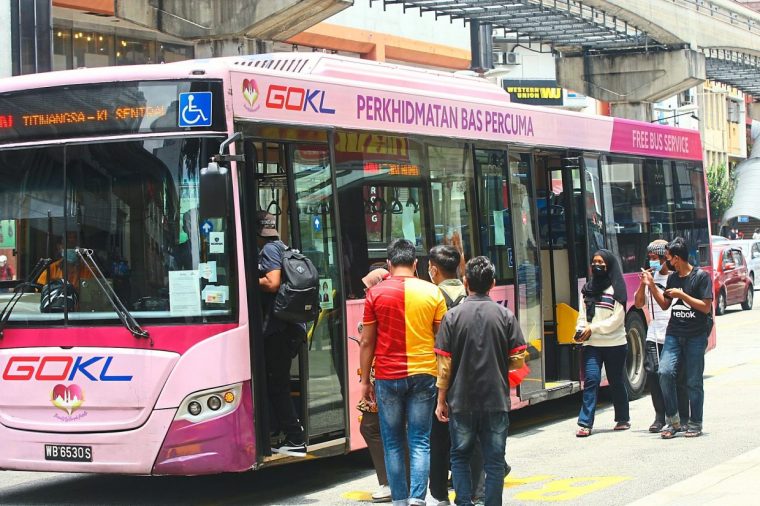
I know, I know. We’ve just talked about how bad Malaysia’s public transport is. But despite all its problems, it can still be a viable option for those who dislike having to drive around all day. If your destination is within walking distance of a bus stop or an LRT station, it might be better to just suck it up and get to walking instead of letting yourself get stuck in the jam.
4. Carpooling
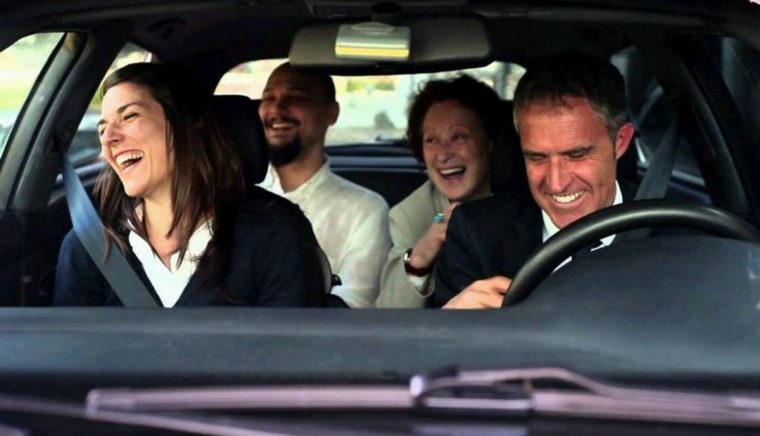
Alternatively, you can try carpooling instead. While this won’t help you directly, reducing the number of cars on the road is bound to make a difference in the long run. There are even apps like Ryde which are meant to help match drivers with commuters heading in the same direction. It’s kind of like Grab, but you get to decide the destination rather than the passenger.
Will Our Traffic Jams Ever End?

Over the past few weeks, our government has proposed several new projects and ideas to help reduce our traffic jam problem.
On 23 May 2022, Works Minister Fadillah Yusof announced that he had approved of several proposals to construct new highways across the Klang Valley, with several other proposals still under consideration.
“With these new highways, we hope the connectivity within the Klang Valley and with the rest of the country will improve,” he said.
Unfortunately, even if they started construction today, any new highways would still take years to finish. For the time being, Malaysian drivers must remember to drive safely and responsibly in order to ensure that our roads can remain as safe and hassle-free as possible.
To learn more about how much bad drivers can affect everyone else on the road, check out:
Do Speed Limits Even Work in Malaysia?
